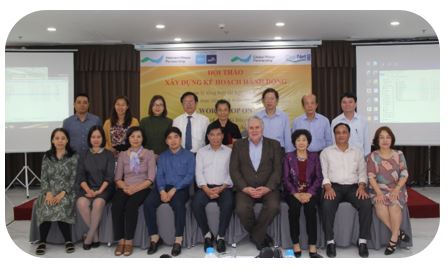With rapid urbanisation, industrialisation, and together with the climate change factor, the risk of degraded natural resources and environmental pollution has increased. The management of water use have revealed many limitations, whilst policies and practices of water use management still have shortcomings. Therefore, bringing up the concept of IWRM to the discussion table is of great importance and this was the reason GWP has facilitated workshops on the Development of SDG IWRM Action plan in many regions.
In Viet Nam, the workshop was organised by the Viet Nam Country Water Partnership and was held on 4 December in Hanoi - Viet Nam with support from the Institute for Water and Environment (IWE) as the co-organiser. The other supporting organisation were the UNEP, UNDP Cap Net, and GWPO. The participants came from different backgrounds, such as representatives of government agencies, university and research centers, the private sector, basin authorities, and NGOs.
The workshop successfully produced several recommendations that were translated into priority areas and key action points. The first priority area was ‘awareness raising, capacity building and behavior change on IWRM’, through consolidating the IWRM concept and its links to other water Sustainable Development Goals (SDGs) and involving more indigenous practices. The second was ‘effectiveness of river basin and transboundary water management model’. The key actions point under this priority area are: review data and information sharing mechanisms; link IWRM with sustainable development objectives; understand and harmonize interests of all sectors, interests, existing and potential conflicts related to water management; review dialogue or joint planning mechanisms; and to consolidate management tools for water resources protection and pollution mitigation and control.
The third priority area was ‘water quality improvement and pollution control’. The key actions plan for this area are monitoring and enforcement and introduce an innovative solution such as application of new technology, applying the circular economy concept, nature-based water treatment, as well as design a pilot project. The last priority area was ‘stakeholder engagement and coordination’. The key action points under this priority area are to enable participation of private sector and NGOs who are concerned with natural disasters and poverty alleviation, as well as promoting cultural dialogue and collaboration for IWRM at all levels.
Apart from developing an action plan, the workshop was able to nominate the members of a task force to represent the various partners, who will continue to consolidate and validate the draft action plan for the SDG through a consultative process. The composition and concept of the task force was then accepted by the Ministry of MARD and the Viet Nam Academy of Water Resources. The next step after this workshop is to discuss with respective stakeholders to identify the key issue in each priority and to develop a mini roadmap of each priority in order to address all the key issues. This follow-up action is expected to be implemented within the first semester of 2019. AW
